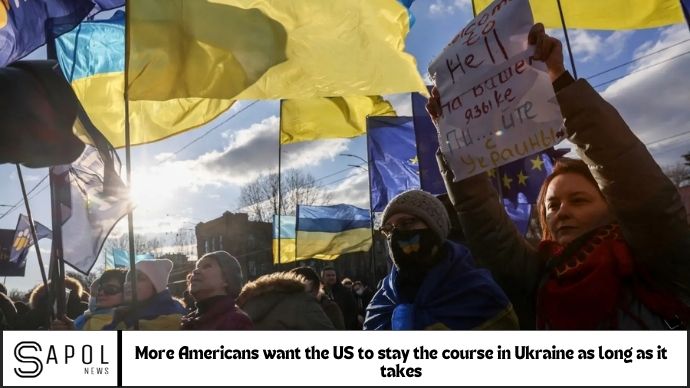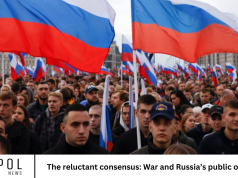More Americans want the US to stay the course in Ukraine as long as it takes Just before the recent Ukrainian advances into Russian territory, there were signs that Americans were becoming somewhat less confident about Ukraine’s chances in the war with Russia. With the U.S. currently in the midst of a heated election season, and some Republican politicians expressing less support for backing Ukraine, one might have expected a decline in public support for Kyiv.
However, the results of our new University of Maryland Critical Issues Poll conducted with SSRS show strong and even increasing support for Ukraine.
The poll, conducted by SSRS, surveyed 1,510 American adults through their probability-based online panel, along with additional oversamples of 202 Black Americans and 200 Hispanics. The survey was carried out from July 26 to August 1, just before Ukraine’s incursion into Russia’s Kursk region. The margin of error is +/- 3.0%. Here are some key takeaways from the poll.
Americans Across the Political Spectrum Sympathize More with Ukraine Than Russia
A clear majority of Americans, regardless of political affiliation, express more sympathy for Ukraine than Russia in the ongoing conflict. According to a recent poll, 62% of respondents favor Ukraine over Russia, with 58% of Republicans and 76% of Democrats sharing this sentiment. In contrast, only 2% of Americans sympathize more with Russia, including 4% of Republicans and 1% of Democrats.
While 20% of Republicans say they sympathize with neither side, only 7% of Democrats feel the same. Additionally, 5% of both Republicans and Democrats stated they sympathize equally with both sides.
Increasing Support for Long-Term U.S. Commitment to Ukraine
The latest poll shows growing support for the U.S. to maintain its backing of Ukraine for as long as necessary. The percentage of respondents advocating for continued U.S. support has risen since the October 2023 poll, reaching the highest level since spring 2023. 48% of all respondents now say the U.S. should support Ukraine for the duration of the conflict, with 37% of Republicans and 63% of Democrats agreeing.
This shift is particularly noteworthy among Republicans, considering recent statements by Republican presidential candidate Donald Trump and Senator J.D. Vance, both of whom have expressed opposition to further U.S. military aid to Ukraine. Despite these positions, public support for continued U.S. involvement in Ukraine continues to rise across both political parties.
Fewer Americans Believe Ukraine Is Winning and Russia Is Losing
Since Russia’s invasion of Ukraine, our polls have tracked American public opinion on the performance and prospects of both Russia and Ukraine in the war. This assessment is important as it could influence the level of public support for continued U.S. backing of Ukraine. In the previous three polls conducted since March-April 2023, there was little change in this evaluation. However, the latest poll reveals a notable decline in the perception that Ukraine is winning and Russia is losing.
In the most recent survey, 30% of respondents believed that Russia is failing, down from 37% in October. Meanwhile, only 21% said Ukraine is succeeding, a decrease from 26% in the previous poll. A plurality of respondents—around one-third—felt that neither side was winning or losing.
When broken down by party lines, Democrats were more likely to believe Ukraine is winning, with 29% holding this view compared to 9% who thought the same about Russia. Republicans, on the other hand, were more divided, with 17% expressing the belief that Russia and Ukraine are equally successful in the conflict.
A Shift in Public Opinion: More Americans Back Long-Term Commitment
Recent surveys show a notable increase in support for continued U.S. involvement in the war. According to a Pew Research Center survey conducted in December 2024, 56% of Americans believe that the U.S. should continue to support Ukraine “as long as it takes” to defeat Russia. This is a sharp rise from earlier in the war when public support was more cautious.
Key Findings:
- 56% of Americans now favor long-term U.S. support for Ukraine.
- Support is particularly strong among Democrats, with about 75% backing continued U.S. assistance.
- Republicans, while more divided, still show substantial backing for U.S. involvement, with 45% in favor of prolonged support.
This shift is indicative of growing awareness about the stakes of the war, both for Ukraine and for global stability. It also reflects the broader public understanding that helping Ukraine may prevent a larger regional conflict or embolden other authoritarian powers, such as China.
Why Are Americans Supporting Long-Term Commitment?
Several factors are contributing to this shift in American public opinion:
Ukrainian Resilience and Success: As Ukrainian forces continue to make significant gains, many Americans are rallying behind their fight for sovereignty and democracy.
The Threat of Global Instability: Many Americans recognize that a Russian victory in Ukraine could destabilize Europe and embolden other authoritarian regimes, making it a global issue, not just a regional one.
Moral Responsibility: A sense of moral obligation to support a nation under attack is driving American support. The idea that the U.S. must stand with Ukraine to defend freedom and human rights resonates with a significant portion of the public.
Bipartisan Agreement on Security: Despite political divisions, there is growing bipartisan agreement that a Russian victory could set dangerous precedents. Both sides of the political aisle are increasingly united in their belief that supporting Ukraine is crucial for U.S. security and global stability.
What This Means for U.S. Foreign Policy
The shift in public opinion has important implications for U.S. foreign policy:
Continued Financial and Military Aid: As public support grows, it is likely that the U.S. will continue to send both military aid and financial assistance to Ukraine. This will include advanced weapons systems, humanitarian aid, and economic support.
Increased NATO Involvement: With growing support for Ukraine’s cause, there could be further collaboration with NATO allies to ensure that Ukraine is equipped to withstand Russian aggression and rebuild once the conflict ends.
Strategic Global Positioning: U.S. support for Ukraine is not just about the conflict itself but is also about positioning the U.S. as a global leader in defending democratic values and countering Russian influence in Europe.
May you also like it:
IRI Ukraine Poll: Strong Support for Victory, EU, and NATO Membership
Latest Polling Reveals Mood in Ukraine and Desire for Optimism
Wide Partisan Divisions in Americans’ Views of the War in Ukraine: What You Need to Know
Conclusion
As the war in Ukraine drags on, American public opinion is increasingly aligned with the idea of staying the course. The growing support for long-term U.S. involvement highlights the importance of Ukraine’s fight for sovereignty, global security, and the preservation of democratic values. This consensus on continued U.S. support may shape U.S. foreign policy for years to come, ensuring that the U.S. plays a central role in the fight for Ukraine’s future.
FAQ
1. How much support does the U.S. have for staying in Ukraine?
Recent polling shows 56% of Americans support continued U.S. assistance to Ukraine for as long as necessary to defeat Russia.
2. Why is there growing support for U.S. involvement in Ukraine?
Support is driven by factors like Ukraine’s resilience, global security concerns, moral responsibility, and bipartisan agreement on the need to counter Russian aggression.
3. Is support for Ukraine strong among both Democrats and Republicans?
Yes, 75% of Democrats and 45% of Republicans support ongoing U.S. involvement in Ukraine.
4. What role does the war in Ukraine play in global security?
Many Americans see the war as a crucial battle for global stability, believing that a Russian victory could embolden other authoritarian regimes and destabilize Europe.
5. What are the implications for U.S. foreign policy?
U.S. foreign policy is likely to focus on continued military and financial aid, increased collaboration with NATO, and a strategic commitment to defending democratic values.
6. What does this shift in public opinion mean for the future of U.S. support for Ukraine?
As public support grows, U.S. commitment to Ukraine is likely to remain strong, potentially influencing foreign policy decisions for years.





